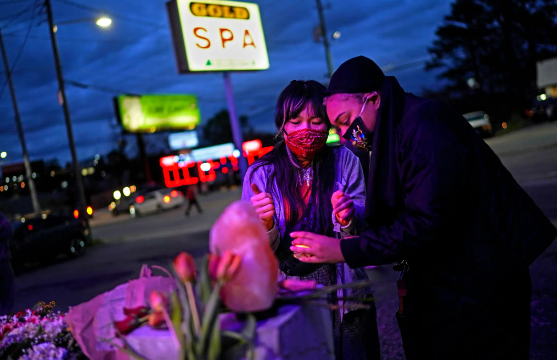我们通过发表他们的论文来表彰我们学生社论大赛的前 10 名获奖者。这是徐麥迪麟,16歲。

。。。李昌文/《纽约时报》
这篇文章由来自纽约布朗克斯霍勒斯曼学校的16岁的Madison Xu撰写,是学习网络第八届年度学生社论大赛的前10名获奖者之一,我们收到了11,202份参赛作品。
We Cannot Fight Anti-Asian Hate Without Dismantling Asian Stereotypes
A few weeks ago, my aunt decided to close the nail salon she had been running for years. Early on in the pandemic, her business was hit hard, regulars refusing to return and associating her salon with the spread of Covid. Now, she fears for the safety of her salon employees — most of them Asian and Asian-American women.
The New York Times has documented a surge of anti-Asian hate crimes during the coronavirus pandemic, including the deaths of six Asian women during the recent mass shooting in Atlanta. These incidents have rightly sparked protests and outrage, yet there can be no effective response unless we look beyond easy explanations. Talk of the former president’s xenophobic rhetoric, or the shooter’s “sex addiction,” only serves to distract from the underlying issue: America’s history of stereotyping, fetishizing and oppressing Asians and Asian-Americans — especially women.
By the 20th century, mainstream media and popular culture had already categorized Asian women into tropes still resonant today, from the hypersexual “Dragon Lady” to the docile “Lotus Flower.” Predating the Chinese Exclusion Act, the Page Act of 1875 made it unlawful for East Asian women to enter the United States without proof that they were “virtuous.” That Asian women were painted as a “moral contagion” becomes even more chilling when juxtaposed with the Atlanta shooter’s claim that the massage parlors were, “a temptation for him that he wanted to eliminate.” Objects of desire easily become objects of hatred. The key: both are things for the dominant class to fetishize, feel entitled to — or dispose of.
By now, many Americans understand how negative stereotypes of Black and Latinx people in the United States have enabled police brutality, anti-immigrant hysteria and violence. However, we tend to react differently to Asian stereotypes. While there are plenty of derogatory tropes (think bad drivers who eat dogs), Asians in this country are often viewed as smart and industrious — a “model minority.” But the truth is, all stereotypes are ultimately dehumanizing, stripping people of their individuality and objectifying them in ways that can lead to shameful violations like the internment of Japanese-Americans during World War II.
Perhaps most dangerously, stereotypes like the submissive “Oriental” serving girl create artificial roles that women are forced to play, or to be punished for “not knowing their place.” When the dominant class feels threatened, even model minorities suddenly become invading Others, the alien “them” displacing “us” and threatening what is rightfully “ours.”
Until we stop regarding Asian stereotypes and the fetishization of Asian women as innocuous, Asians and Asian-Americans will continue to face the threat of racist violence. Recognizing that anti-Asian prejudice is deeply rooted in American history is the first step toward dismantling those dangerous stereotypes.
Works Cited
Jeong, May. “The Deep American Roots of the Atlanta Shootings.” The New York Times, 19 March 2021.
Lang, Cady and Paulina Cachero. “How a Long History of Intertwined Racism and Misogyny Leaves Asian Women in America Vulnerable to Violence.” Time, 7 April 2021.